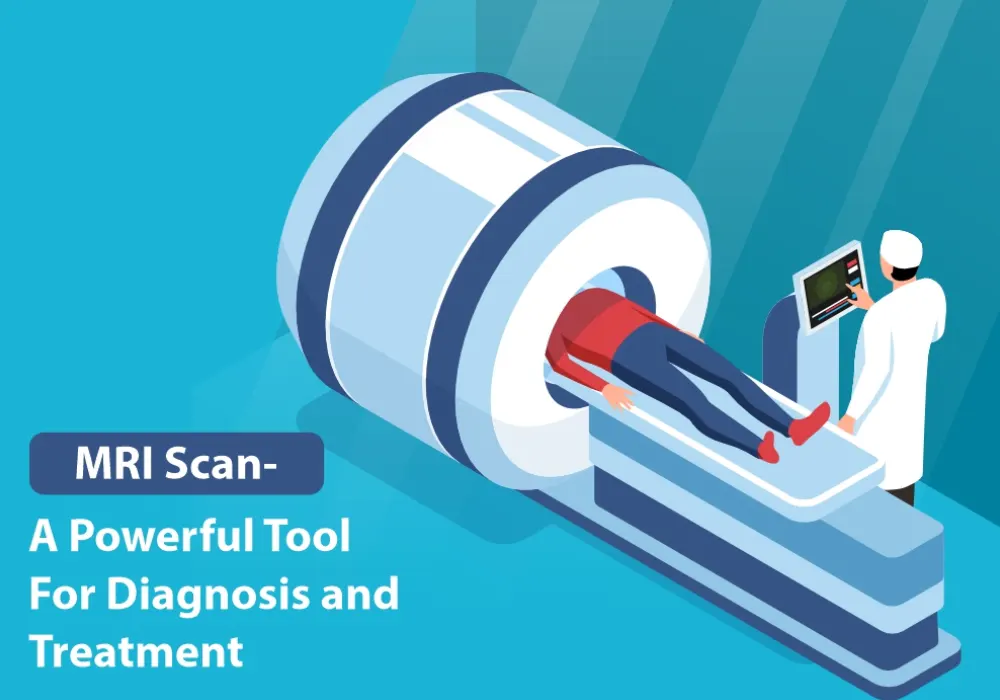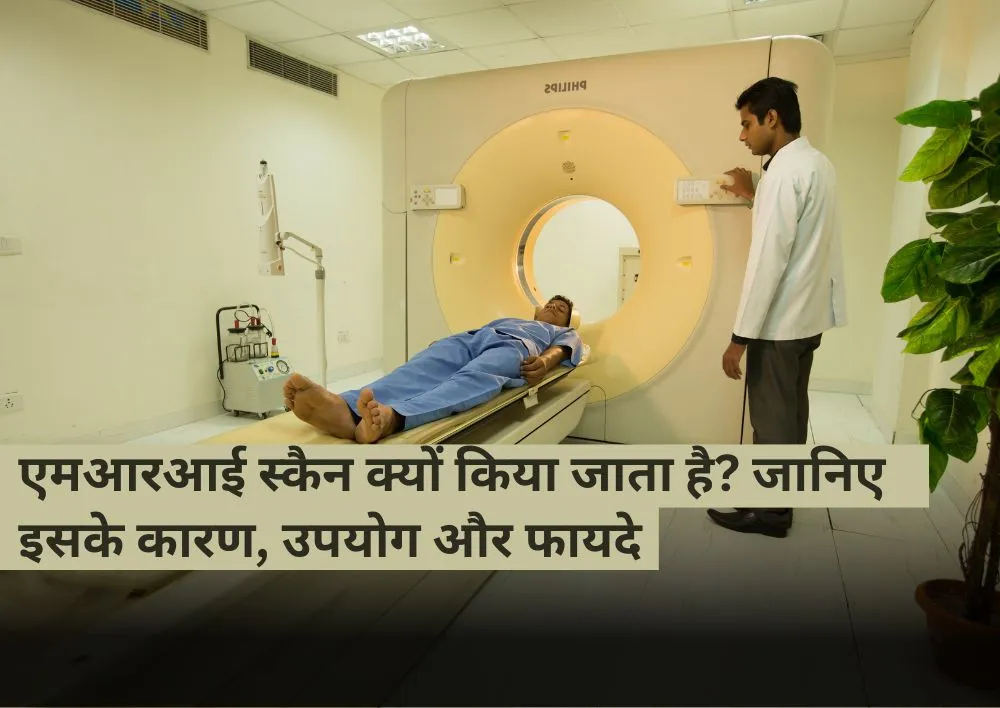MRI Scan- A Powerful Tool for Diagnosis and Treatment
Magnetic resonance imaging (MRI) scan is an imaging technique. This is an effective diagnostic tool usually recommended by doctor to diagnose a variety of health issues that are affecting the human body.
An MRI scan allows healthcare provider to have a look into the inside of the body. Because it provides the detailed picture of the internal structure of the body, so doctors can easily see what is happening inside your body and provide the treatment accordingly to treat a wider range of medical conditions.
It is considered high-powered diagnostic tool to diagnose and treat various of health issues because of its reliability and effectiveness.
This blog uncovers the power of an innovative and powerful diagnostic tool such as MRI scans.
Topic Covered:
- What is an MRI Scan?
- Why is MRI scan recommended?
- What are the common types of an MRI Scan?
- How an MRI scan is beneficial?
- What is the procedure of an MRI scan?
- What are the necessary precautions to follow before undergoing an MRI Scan?
- What is the cost of an MRI Scan?
What is an MRI Scan?
Magnetic resonance imaging (MRI) scan is an imaging technique that harnesses a very powerful magnetic field and radio waves to generate detailed images of the tissues and internal organs and tissues in your body. Unlike other Imaging techniques such as X-Rays and CT scans, an MRI scan doesn’t involve the use of ionizing radiation. That’s why it is safe to undergo an MRI scan repeatedly. Depending on the condition of the patient, to diagnose the problem effectively, the doctor recommends MRI with or without contrast.
If you have been recommended for an MRI scan for your specific health issues, then book your appointment at the best diagnostic centre in Gurgaon for quality diagnostic procedures with 100% accurate results.
Usage of MRI Scan
- Brain and spinal cord problems: These scans help doctor diagnose various medical conditions related to our brain and spinal cord including tumors, herniated disk, Parkinson’s disease, dementia, stroke, and multiple sclerosis.
- Heart and blood vessel problems: MRI scans are used to diagnose cardiac health conditions, such as heart attack, heart failure, and valve problems.
- Cancer: MRI scans can be used to diagnose cancer. It helps the doctor in taking decision regarding the cancer treatment as well as monitor the response of on-going treatment.
- Bone and joint problems: MRI scans image the bones and joints. They diagnose various bone and joint conditions including as arthritis, ligament tear, and torn meniscus.
- Soft tissue injuries: MRI scans are used to generate the images of soft tissues, such as muscles, tendons, and ligaments. An MRI scan helps in diagnosing the soft tissues injuries, such as sprains, strains, and tears.
- Infections: MRI scans can be used to diagnose infections.
- Tumors: MRI scans can be used to detect and diagnose tumors. Doctors recommend MRI scan to plan tumor treatment and monitor the response to ongoing treatment for tumor.
- Pregnancy complications: MRI scans can be used to diagnose pregnancy complications, such as placenta previa and placental abruption.
What the Types of MRI scans
There are various types of MRI scans to image the body parts for diagnosis of different health conditions. The doctor prescribes you specific MRI scan, to image the particular body to diagnose the specific health condition. Some of the most commonly recommended MRI scans include:
- Brain MRI: The Brain MRI scan is used to image the internal structure of the brain to diagnose different types of brain conditions including tumors, Parkinson’s Disease, Alzheimer’s Problem, dementia, stroke, infection, brain hemorrhage, brain damage due to epilepsy and multiple sclerosis.
- Spinal MRI: The Spinal MRI scan is used to image the spinal cord structure and its surrounding tissues to diagnose various kinds of spinal cord conditions, including herniated discs, spinal stenosis, spinal tumor, inflammation of the spinal cord, spinal cord compression, birth defects in the spinal cord and many more.
- Cardiac MRI (Heart MRI): The Cardiac MRI scan, also known as Heart MRI scan is used to create an image of the heart and blood vessels to diagnose various heart conditions, such as heart attack, heart failure, congenital heart issues, heart muscle damage, enlarged heart and valve problems and many more.
- MRI Arthrogram: MRI Arthrogram, also known as MRI Arthrography is used to image the joints to diagnose various types of joint conditions, such as arthritis, torn ligaments, meniscal tears, and many more.
- Breast MRI: The Breast MRI is used to obtain the image of the breasts to diagnose various breast-related issues such as breast cancer and its extent, rupture of breast implants, and many more.
- MRI Angiography (MRA): MRI Angiography (MRA), also known as MRI Angiogram is used to image blood vessels to diagnose a variety of blood vessel-related problems, such as blockages, aneurysms, aortic dissection, Renal artery stenosis, arteriovenous malformations and many more.
Apart from the mentioned above types of MRI scans, Doctors recommend many other types of MRI scans to diagnose specific conditions related to the liver, kidneys, pancreas, muscles, ligaments, tendons, and other organs.
What are the Benefits of MRI Scans?
MRI scans are highly recommended over other imaging techniques because of following benefits:
- Non-invasive: MRI scan is a non-invasive procedure, which does not require any incisions.
- Painless: MRI scans are painless and safe. But you may experience little bit discomfort because of lying still and straight for long time duration.
- Detailed Imaging: MRI scans provides the images of the inside of the body in detail. It covers the organs, bones and soft tissues as well.
- No exposure to radiations: MRI scans does not involve the use of any harmful radiation unlike other imaging techniques. So, it is a safe option for patients of all age group.
What to Expect During an MRI Scan?
A Magnetic resonance imaging (MRI) scan is a non-invasive and painless procedure.
Here is a step-by-step procedure of an MRI scan and what to expect during an MRI Scan:
- Depending on whether you are prescribed for MRI with contrast or without contrast, the MRI technician will inject you with the contrast dye accordingly. In case of contrast dye involvement, you will be asked to take rest for around 30-45 mins. before undergoing a scan.
- Before undergoing an MRI scan, MRI Technician will give you earplugs to wear during the procedure because the MRI scanner makes noise while scanning.
- You will be asked to lie straight and still on a narrow scanning table, attached to the MRI scanner, and will slide into the scanner.
- The technician will place coils on the specific body part to be scanned to help focus the MRI signals.
- The technician will be in another room during the procedure and instruct you via intercom. You will be asked to hold your breath for a short period during the scanning procedure.
- During the scanning process, the scanner will produce a powerful magnetic field around your body, and the radio waves will be pulsed through the body and interact with the hydrogen atoms in the body.
- The MRI scanner will measure the energy released by the hydrogen atoms and the computer system will create detailed images of the specific body part for diagnosis of the problem.
- The complete process of MRI scan takes around 45-60 minutes in completion.
How Do I Prepare for an MRI Scan?
An MRI Scan is a completely safe procedure but to prevent any kind of complication during the procedure, you are advised to follow the guidelines of your doctor before undergoing a scan.
Here are some general guidelines to be followed by patients before undergoing the procedure:
- If you feel claustrophobic, please inform the doctor as well as the technician
- Because an MRI scanner utilizes a powerful magnetic field, so if you have any metal implants in your body like surgical staples, pacemakers, artificial joints, etc, please inform your doctor and technician.
- During pregnancy, undergoing an MRI scan is generally safe but, in some cases, the doctor may recommend avoiding them. So, inform your doctor if you are expecting.
- If you are breastfeeding your child, then inform your doctor and technician regarding the same.
- Remove all metallic items from your body as they may interfere during the scan and affect the result.
What is the Cost of an MRI Scan?
In Gurgaon, there are various diagnostic centres and hospitals offering MRI scan services. If we talk about the cost of an MRI scan in Gurgaon, then we can say that it varies from hospital to hospital and diagnostic centre to diagnostic centre, depending on the location of the facility, type of scan, and quality of the machine used. It typically lies between INR 4000 to INR 20000.
Book your prescribed MRI scan at the best MRI centre in Gurgaon. Our MRI department is well-equipped with a 1.5 Tesla MRI scanner and staffed by renowned radiologists to ensure high-quality imaging without any quality compromise. Compare to other diagnostic center’s and hospitals in Gurgaon, Miracles Apollo is a multi-specialty hospital offering a wide range of pocket-friendly MRI scans to diagnose a variety of health issues.
Conclusion:
In conclusion, Magnetic resonance imaging (MRI) scans are a non-invasive and painless procedure. It is helpful in diagnosing variety of complex medical conditions which are not seen in other imaging techniques.
According to your health condition, the doctor decides which type of MRI scan is the best for you to diagnose and treat the problem. If you have any questions or concerns related to MRI scans, be sure to talk to your doctor.



_in_Pregnancy.webp)









Was the information useful?
0 0